No getting ‘round it: Employee voices need to be heard
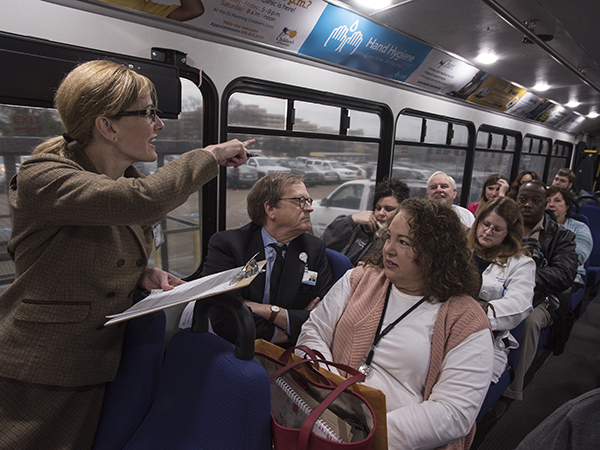
When University of Mississippi Medical Center leaders asked employees face-to-face their feelings on communication and respect on campus, they got honest feedback.
Their conversations were part of Leadership Rounds, a key element of UMMC's journey to becoming a high-reliability organization. More than 100 Medical Center executives, physicians, managers and administrators fanned out across campus shortly after 7 a.m. Tuesday. They met employees where they were, be it at labor and delivery in Wiser Hospital or on a shuttle bus circling the stadium parking lot.
“What does respect mean to you in the workplace? How do you feel disrespected?” Shannon Wentz, administrator to Chief Medical Officer Michael Henderson, asked those riding the bus piloted by Charles “Coach” Ward.
One employee said she felt disrespected when she and her supervisor met confidentially, yet she later discovered some of her coworkers knew details of the conversation. “You should be able to talk to your supervisor and it not go back to everybody else,” she said.
Sometimes, lack of respect in the workplace can be conveyed in a more subtle way. “Attitude,” said April Thornton, a pediatric neurology scheduler.
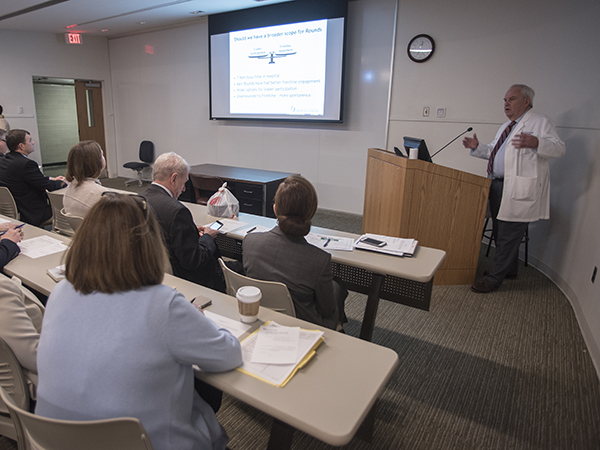
Chief Medical Officer Michael Henderson, upper right, talks to Medical Center executives, physicians and administrators before Leadership Rounds.
For more than a year, a cross-section of leaders have taken part in Leadership Rounds once a month. Each session has a theme, and the activity spans about two hours. It's a chance for leaders to get to know front-line staff and hear their voices - and for leaders to get to know each other, too, Henderson said.
Leadership Rounds are held on one “Traditional Tuesday” morning a month, with leaders gathering in the third-floor classroom of the medical school before breaking into teams of three or four and deploying to meet staff on hospital floors and in hospital departments. They also round during night and afternoon shifts with “Fun Friday” visits at 4 a.m., or “Ambulatory Afternoon” rounds to clinics weekdays at 2 p.m. On weekends, leaders also want to meet front-line employees, hence “Saturday Specials.”
In the recent campus-wide survey on safety and employee engagement, areas voiced by employees as needing improvement included communication and respectfulness. “This tells us our employees are open and willing to share information. It's up to us what to do with it,” said Liz Youngblood, CEO of UMMC's adult hospitals.
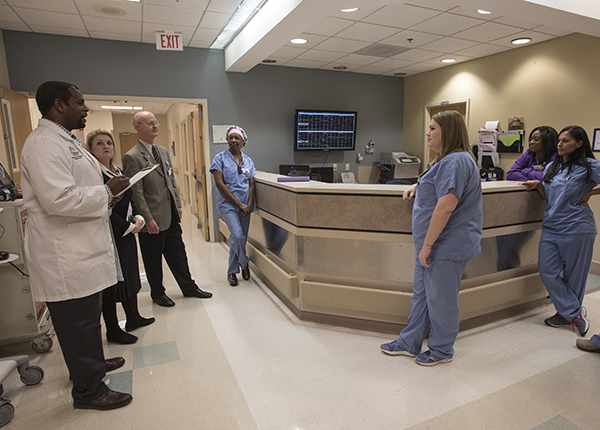
Driscoll Devaul, left, Molly Brasfield and Dr. Charles O'Mara speak with nurses and staff in labor and delivery at Wiser Hospital.
On Tuesday, teams of three walked to University, Wiser, Batson and Critical Care hospitals, asking front-line staff not just questions about the day's focus area, but how they're doing, and what leadership can do to support them.
“Hi! Why do you walk instead of ride the bus?” Henderson asked LaDonna Overton, performance improvement coordinator in the School of Dentistry, as she passed by the bus stop in front of University Hospital. “I think it's quicker,” Overton said with a grin.
Henderson, whose office coordinates the logistics and participants for Leadership Rounds, queried shuttle riders about what works for them when it comes to communication vital to their jobs. Face to face? Email? Facebook? Texting?
“Email is good, and the message that the vice chancellor sends on Fridays. I like the questions that people have in it,” said Walter Allen, an IT support analyst who sat by Henderson on the bus.
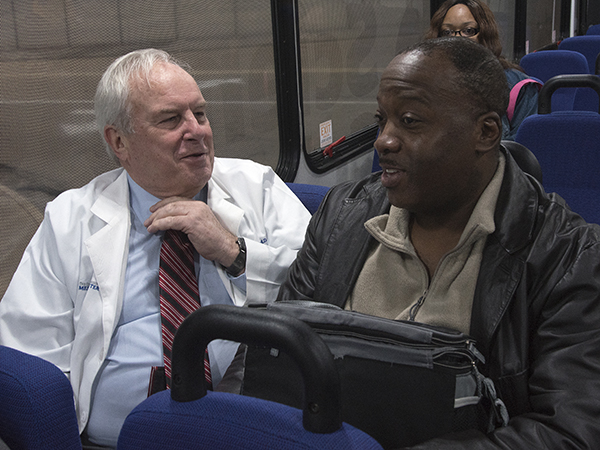
Henderson chats with IT support analyst Walter Allen on a UMMC shuttle bus.
The team of Dr. Charles O'Mara, associate chancellor for clinical affairs; Driscoll Devaul, Batson's director of respiratory care; and Molly Brasfield, director of human resources for academics and research, caught nurses and techs between patients on Wiser's second floor.
“This is an opportunity for us to pick your brains,” Devaul said. “We're all engaging to make this place the best it can be.”
O'Mara introduced himself to surgical tech Juliet Carral, who told him she'd worked for another local hospital before finding her home at UMMC. “What's your preferred means of communication?” he asked Amy Edwards, a labor and delivery RN.
“Probably the flyers on the bulletin boards rather than email,” she told him.
As leaders came back together in the amphitheater to share their findings, some common themes resounded. Among them: Employees - in particular, nurses -- are often too busy to check their email during the day, and a large number prefer face-to-face communication with their supervisor and coworkers to keep in the loop, ask questions and voice concerns.
Others said they simply get too many emails, and that they want to be able to disconnect when they leave the office. One employee told a Leadership Rounds team that she felt it was disrespectful to expect her to check her email when she was off the clock.
Dr. Rick Barr, professor and chair of the Department of Pediatrics, visited the outpatient surgery post-anesthesia care unit. “It was uplifting to hear how much they feel respected as nurses,” he said. “They feel respected by the people that they work with. They don't always feel respected by the system.”
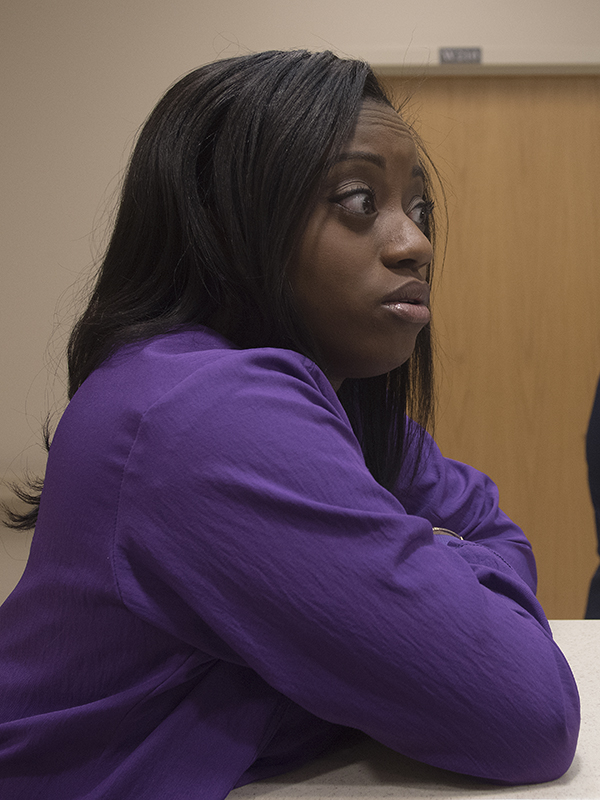
Marrion Harper, a nurse in labor and delivery, listens to visitors to labor and delivery during Leadership Rounds.
And Michelle Welander, Batson's chief nursing and clinical services officer, told the group about her rounding visit to Wiser's Mother-Baby Unit, where well babies room in with their mothers to promote bonding. “If you're having a down day, then go and visit them. Their leadership has really made the difference there,” she said. “It's amazing what this unit has done.”
Whether employees feel engaged or not can make the difference in them considering UMMC their employer of choice. For Marrion Harper, a registered nurse in labor and delivery, the Medical Center set that tone when she was cared for as a patient - in labor and delivery.
“The experience led me to go to nursing school here,” she said. “It's a family. We help each other out, and we know each other on a personal level. We feel connected.”
And although she's worked a number of places since becoming a nurse, Harper said, “the people here are what makes it a good team.
“It's home,” she said. “We do all come back.”


